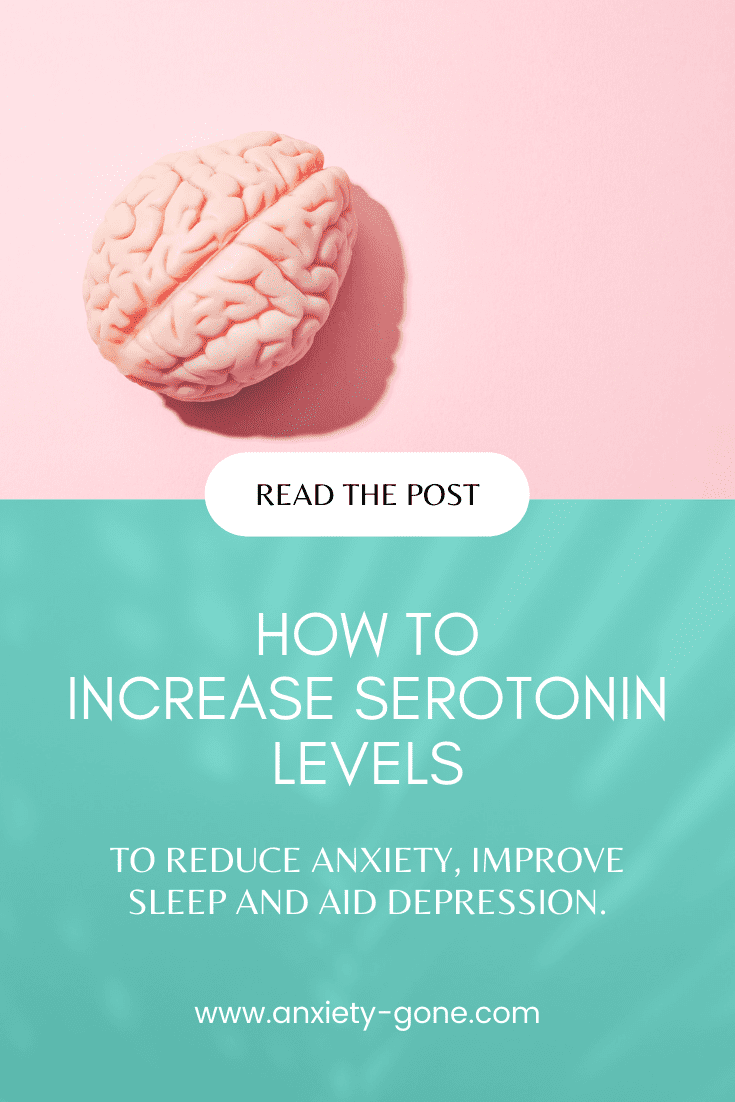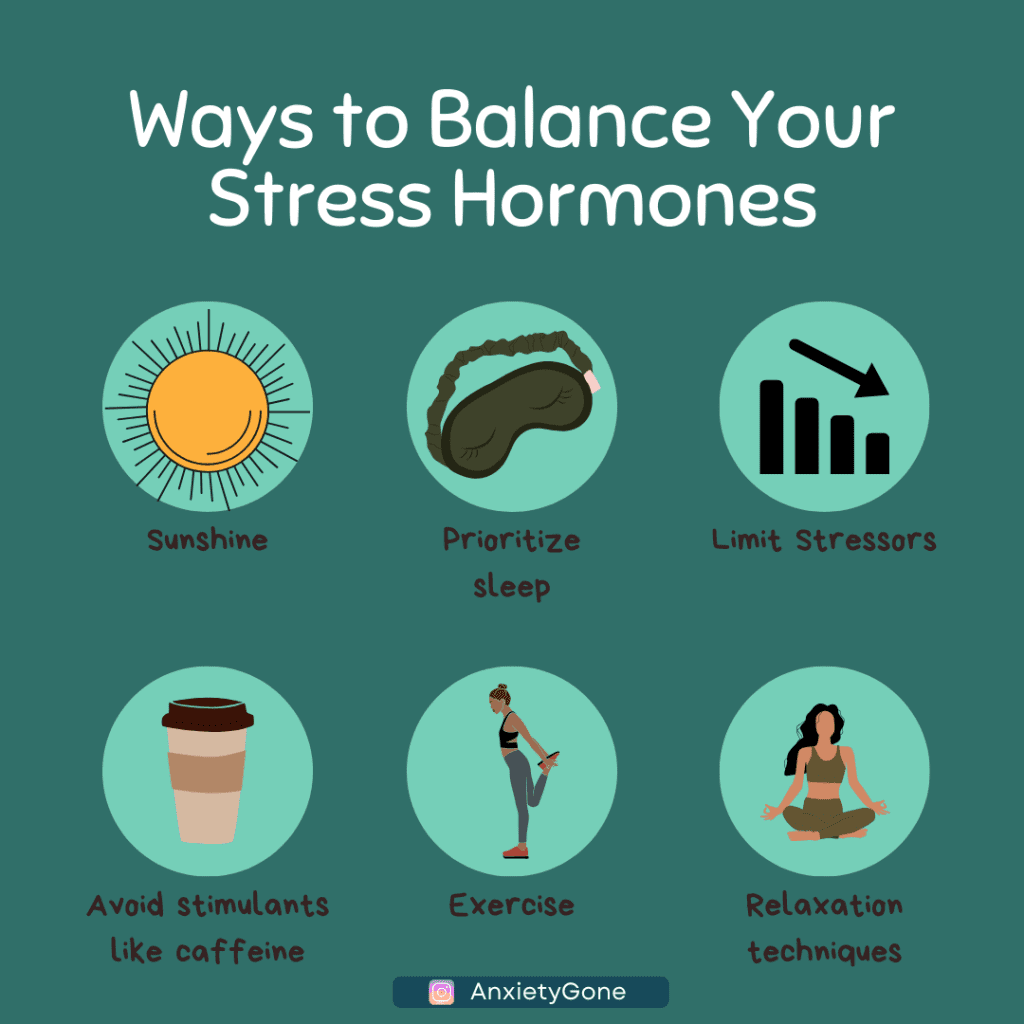Full Disclosure: Clicking on these links could mean a tiny commission for me, at no extra cost to you.
If you’ve ever paid attention to how amazing you feel after a great yoga class or trip to the spa, you have already experienced the boost of happiness of increasing your serotonin levels. These feel-good self care activities have the power to naturally increase serotonin levels, which are commonly referred to as “the happy brain chemical”. When your serotonin levels are optimal, you feel more focused, happier, calmer and emotionally stable. The best part? Serotonin is a naturally-occurring response in the body that you can increase to release more of these feel-good hormones and to get a boost of natural anxiety relief. As for the ways to increase serotonin, we’ve got you covered.

What is Serotonin?
Serotonin and Mental Health
Serotonin is a hormone that helps regulate your mood and emotions. When serotonin levels are at a normal level, you feel more focused, emotionally stable, calm and happier in general. However, when serotonin levels are low, it can cause depression, anxiety, OCD and sleep disorders. In fact, serotonin and mental health are so closely linked that many prescription medications for treating anxiety and depression are selective serotonin reuptake inhibitor (SSRI). These are used to increase serotonin levels when your body isn’t creating enough of it for you.
As such, maintaining adequate serotonin levels is essential for promoting mental health and emotional stability. Various factors, including genetics, diet, exercise, and environmental influences, can affect serotonin production and activity in the body. But most importantly, you can increase serotonin levels to give yourself an extra boost of those happy chemicals.
Benefits of Boosting Serotonin Levels
Serotonin is a brain chemical that impacts every part of your body, from your emotions and mood to your motor skills. It helps with the following:
Low serotonin levels have been associated with anxiety and depression, and their effects can significantly impact mental health. Here are some of the effects of low serotonin on anxiety and depression:
- Increased Anxiety: Low serotonin levels can lead to heightened feelings of anxiety, including excessive worry, restlessness, and tension.
- Mood Swings: Serotonin deficiency may contribute to unstable moods, causing individuals to experience frequent mood swings, irritability, and emotional volatility.
- Panic Attacks: Insufficient serotonin levels have been linked to an increased risk of panic attacks, characterized by sudden and intense feelings of fear or impending doom.
- Persistent Sadness: In depression, low serotonin levels are often associated with persistent feelings of sadness, emptiness, and hopelessness.
- Fatigue and Low Energy: Individuals with low serotonin levels may experience chronic fatigue, low energy levels, and difficulty in initiating or maintaining activities.
- Sleep Disturbances: Serotonin plays a crucial role in regulating sleep patterns, so low levels can lead to insomnia, disrupted sleep, or irregular sleep-wake cycles, which can exacerbate both anxiety and depression.
- Loss of Interest: A decrease in serotonin activity can result in a loss of interest or pleasure in activities once enjoyed, a common symptom of depression known as anhedonia.
- Difficulty Concentrating: Low serotonin levels may impair cognitive function, leading to difficulties in concentration, memory problems, and decreased mental clarity.
- Increased Sensitivity to Stress: Serotonin helps modulate the body’s stress response, so low levels may make individuals more susceptible to the effects of stress, exacerbating symptoms of anxiety and depression.
- Suicidal Thoughts: Severe serotonin imbalances have been associated with an increased risk of suicidal thoughts or behaviors, particularly in individuals with depression. Please speak with an online therapist today if you’re experiencing suicidal thoughts.
How to Increase Serotonin Levels: Natural Serotonin Boosters
Understanding how to properly improve your serotonin levels naturally can make a huge difference in how you feel. There are prescription medications (SSRI) that can help you with this, as well as natural serotonin boosters. Below are some of our top recommendations on increasing serotonin levels naturally and tips on how to incorporate these healthy activities into your everyday routine.
1. Exposure to Bright Light
Spend time outdoors in natural sunlight, especially in the morning, as sunlight exposure stimulates the production of serotonin in the brain. If you can’t get outdoors or live in a cloudy place, light therapy is an excellent remedy for treating disorders associated with lower serotonin levels, such as seasonal depression. Find a great selection of light therapy products here.
2. Regular Exercise
Exercise has all kinds of short-term and long-term benefits that impact the mind and body. This is precisely why it’s often the top recommendations for maintaining optimal health on all levels. Whether it’s a quick stroll around the block with your dog, nightly yoga or an intense gym session, all forms of physical activity can help increase serotonin levels.
Exclusive Offer: Start Online Yoga Classes Today
3. Healthy Diet
You knew it was coming: diet. Consume a balanced diet rich in whole grains, fruits, vegetables, lean proteins, and healthy fats. Foods high in tryptophan, specifically can help increase serotonin levels as tryptophan is a precursor to serotonin. Think such as turkey, chicken, nuts, seeds, tofu, and dairy products.
You can also try a custom online diet plan, like Custom Keto Diet, to create a meal plan that is rich in serotonin-boosting foods.
4. Increase Nutrition with Natural Supplements
To assist with getting more nutrients in your diet by eating clean, take some natural supplements for anxiety, sleep or mental health in general. You can find a complete list of the top supplements for anxiety here. However, supplements for serotonin specifically often include CBD oil, magnesium supplements and 5-HTP (5-hydroxytryptophan), which is a precursor to serotonin. Vitamin B6 is also involved in serotonin synthesis.
5. Get a Massage
Physical touch, whether it’s a soft back rub from your spouse or a therapeutic massage at a salon, has shown to be an incredible way to increase serotonin levels. Consider receiving regular massages, as this can increase serotonin and dopamine levels while reducing stress hormones.
6. Coffee (in moderation, of course)
Coffee is often recognized as “the bad guy” when it comes to anxiety, but it can bring many benefits as well, such as increasing your serotonin and dopamine levels. But there’s a catch. The boost is only provided for as long as you take it. Once you stop drinking coffee, the withdrawal can begin, which is where your brain starts acting as if there is a deficiency. Keep in mind, coffee can also increase anxiety, cause insomnia, make you more jittery, etc. So, always consume it in moderation.
7. Meditation
Meditating can help relieve stress, increase dopamine and promote a positive outlook on life, all of which can greatly boost serotonin levels. It’s an easy thing to do too: just sit in a quiet place and bring attention to your inner world. You can use guided meditation tracks or soothing music, a meditation machine, a candle flame, crystals for anxiety relief or any of the meditation tools found on the Anxiety Gone mental health and wellness store.
Buy Now: Muse Meditation Headband
8. Improve Your Sleep
Prioritize getting quality sleep to increase your serotonin levels. You can start by maintaining a consistent sleep schedule, creating a comfortable sleep environment, and practicing good sleep hygiene habits. You can also incorporate a sleep tracking device to stay on top of your sleep quality.
Buy Now: Sleepon Evidence-based Management
9. Stress Management
With serotonin levels being so directly linked to stress levels, it only makes sense that stress management is a crucial step to increase serotonin levels.
Incorporate stress-reducing activities into your daily routine, such as mindfulness, yoga, tai chi, or spending time in nature, to lower cortisol levels and support serotonin synthesis.
10. Practice Mindfulness
Practice mindfulness-based techniques, meditation, or deep breathing exercises, which can help reduce stress and promote relaxation, thereby increasing serotonin levels.
Exclusive Offer: Download the #1 Mindfulness App Here















































